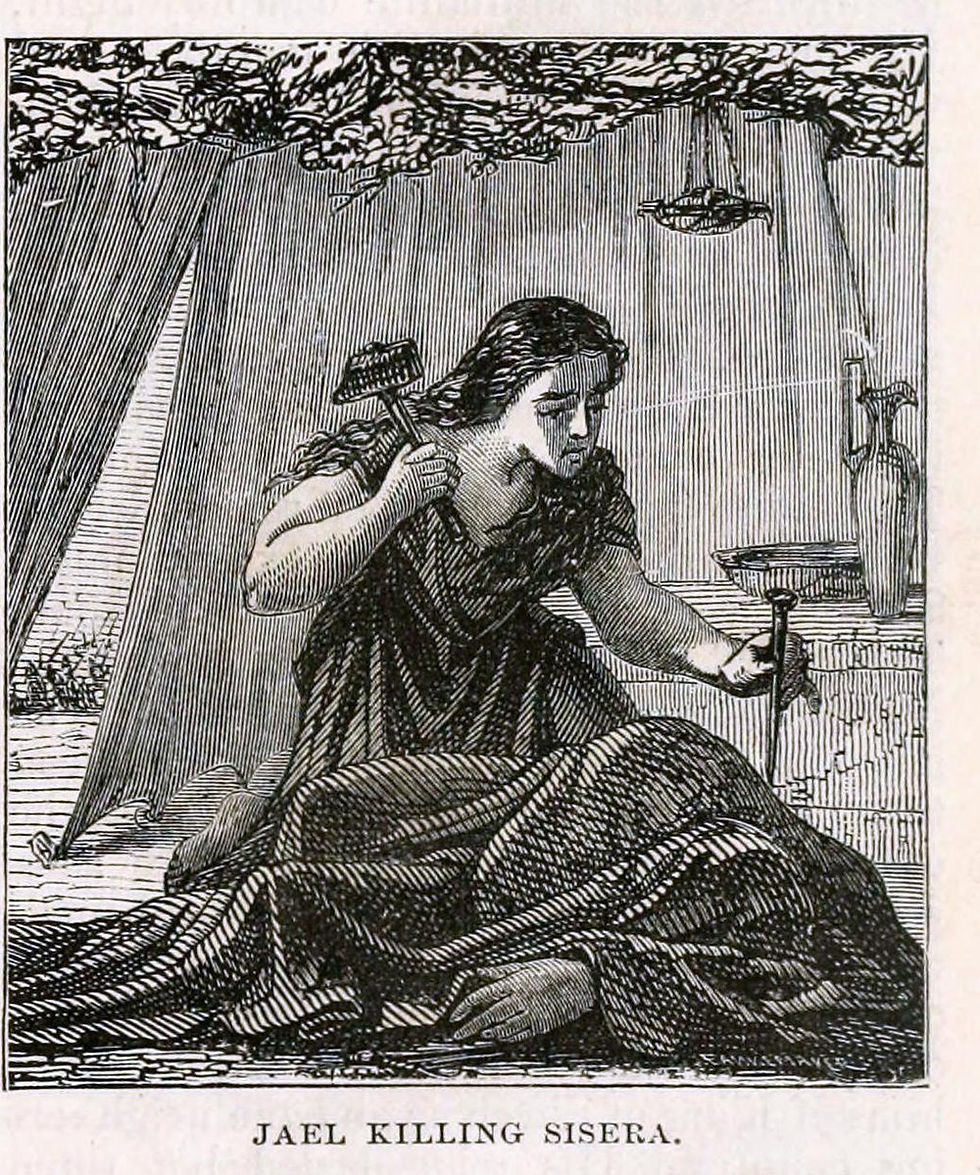
Deborah: The Judge Who Was Not, Serving a Unique and Singular Role
- Peacekeeper

- Mar 25, 2024
- 6 min read
This article delves into the fascinating story of Deborah, often misunderstood within the rich tapestry of biblical narratives. Unlike her predecessors and successors, Deborah served in a unique judicial capacity, distinct from the typical roles associated with the title of judge in the Bible. As the fourth judge of ancient Israel, she illuminates the distinctive aspects of biblical feminine leadership through her esteemed titles as a "mother in Israel" and a prophetess, along with her prophetic gifts. Aiming to clarify and provide edifying insights into her character, this piece emphasizes a deeper understanding of Deborah’s multifaceted position. Her story, intertwined with themes of divine guidance and wisdom, presents a compelling narrative of leadership that is both unique and instructive. It's crucial to recognize that both conservative and liberal Christians might be tempted to read into Deborah’s story, potentially diluting its impact and significance. This introduction sets the stage for a comprehensive examination of Deborah's singular role, aiming to enrich our appreciation for one of the Bible's most intriguing figures while remaining faithful to the narrative and its lessons.
Deborah: The Singular Judicial Judge Among the Biblical Leaders

Deborah stands out as the only judge of Israel to fulfill the role in a judicial sense, distinguishing her from the male judges who preceded and succeeded her. These men were primarily recognized as deliverers, a title not attributed to Deborah. Uniquely, she did not assume the role of a military leader, setting her apart from her counterparts. Instead, Deborah held court under the Palm of Deborah, where she arbitrated disputes and delivered judgments, embodying the judicial essence of her title more directly than any other judge. To further illustrate this point, it's notable that the other judges did not hold court, listen to complaints, or make legal decisions in the manner that Deborah did. This distinct position underscores her unique contribution to the leadership and governance of ancient Israel, highlighting her unparalleled role in the biblical narrative.
Deborah, a Prophetess

Among her unique roles and titles, Deborah was notably distinct as a Prophetess, a distinction that underscores her exceptional position within the biblical narrative. Described in Judges 4:4-5 as endowed with the divine gift of prophecy, she played a crucial role in communicating God's will to the people of Israel, particularly in their victory over the Canaanites. Interestingly, unlike other judges, the call to "arise" or take up arms for deliverance was not directed at Deborah herself but rather at Barak, to whom she conveyed the divine command. This detail underscores her unique approach, emphasizing wisdom and divine insight. The title of "Prophetess" is profound, highlighting her spiritual gift and role within the Isrealite society. Identified also as "the wife of Lappidoth" in Judges 4:4, Deborah's identity integrates personal and spiritual realms seamlessly. Her prophetic insight established her as a pivotal figure capable of guiding her people through turmoil and into triumph, embodying guidance and wisdom.
Barak Attributed Credit as a Judge?

Fascinatingly, Barak is given credit along with the other Judges in the book of Hebrews, where it says, "For time
would fail me to tell of Gideon, Barak, Samson, Jephthah, of David and Samuel and the prophets— who through faith conquered kingdoms, enforced justice, obtained promises, stopped the mouths of lions, quenched the power of fire, escaped the edge of the sword, were made strong out of weakness, became mighty in war, put foreign armies to flight." (Hebrews 11:32-34 ESV). Barak was called as the military leader of the Israelites, tasked with the divine command to lead Israel against their oppressors. When Deborah conveyed God's message to Barak, she affirmed, "The Lord, the God of Israel, commands you: ‘Go, take with you ten thousand men of Naphtali and Zebulun and lead them up to Mount Tabor. I will lead Sisera, the commander of Jabin’s army, with his chariots and his troops to the Kishon River and give him into your hands.’" (Judges 4:6-7 NIV). This directly recognized Barak as the military leader and deliverer, with the Lord's assurance that "this day the Lord has given Sisera into your hands" (Judges 4:14 NIV), underscoring the prophetic certainty of victory. Although Deborah's prophecy specifically stated that the victory over Sisera would be delivered into "the hands of a woman," not expressly stating "my hands," it highlighted the role of Jael in the narrative. Deborah's ascent to the hill with Barak, without positioning herself as the military commander, underscores her respect for the orthodox roles within the biblical narrative, offering insightful commentary on the interplay of faith, prophecy, and divine action in Israel's deliverance.
Jael: Her Role in the Deborah Narrative

Jael's story is found in Judges 4 and 5, particularly highlighted in the Song of Deborah, one of the oldest parts of the Bible.
After being defeated by Barak's forces, as prophesied by Deborah, Sisera fled the battlefield on foot and sought refuge in the tent of Heber the Kenite. Heber was at peace with King Jabin of Hazor, and Sisera believed he would find safety there. Jael, Heber's wife, welcomed Sisera into her tent, offering him hospitality—a gesture that would have been seen as a sacred duty in the ancient Near East.
However, recognizing the opportunity to deliver Israel from its oppressor, Jael took a bold and decisive action. While Sisera was sleeping, she took a tent peg and a hammer and killed him by driving the peg through his temple into the ground. This act of courage fulfilled Deborah's prophecy that the honor of defeating Sisera would go to a woman, not Barak, who had been the military leader of the Israelites in this conflict.
Jael's actions, though violent, are celebrated in the Song of Deborah as a heroic deed that contributed to the liberation of Israel from Canaanite oppression.
This pivotal moment involving Jael stems from Barak's hesitance to fulfill his calling as Israel's deliverer without Deborah's direct support. In Judges 4, when Deborah relays God’s command to Barak to lead an attack against the Canaanite commander Sisera, Barak responds, "If you will go with me, I will go; but if you will not go with me, I will not go" (Judges 4:8). This condition placed upon his obedience highlights a lack of full confidence in God's promise without Deborah's presence. Consequently, Deborah agrees to accompany him but prophesies that the honor of defeating Sisera would not belong to Barak but would instead go to a woman, stating, "The Lord will sell Sisera into the hand of a woman" (Judges 4:9). This prophecy comes to fruition when Jael, the wife of Heber the Kenite, delivers the fatal blow to Sisera, thereby claiming the honor that could have been Barak's. This sequence of events underscores the theme of faith and obedience in God’s plans, illustrating how deviations from divine commands can lead to unforeseen outcomes, as evidenced by Jael's decisive role in the victory over the Canaanites.
Deborah: The Judge Who Was Not, and Barak: The Judge Who Was Called

Earlier in this article, I mentioned how both conservative and liberal readers might feel tempted to project contemporary interpretations onto the biblical account of Deborah. Some may portray her as a prototypical feminist "girl boss," while others argue she arose purely out of necessity due to the failures of men. However, it's crucial to understand that Deborah's role was deeply orthodox, adhering to the traditional vocations of men and women within the biblical narrative. Her story exemplifies how feminine leadership serves as a complement to male leadership, particularly in times that call for wisdom and decisive action. Rather than viewing Deborah's emergence as a judge and prophetess through the lens of modern agendas, her story should be appreciated for what it truly represents: a divine orchestration where her leadership, wisdom, and motherly guidance to the Israelites highlight the complementary strengths of men and women working together to fulfill God's purposes.
As we conclude our exploration of the Biblical narratives, I extend my gratitude to you, the reader, for journeying through the story of Deborah with me. It is my sincere hope that this examination has not only provided insight but also edified your overall understanding. May your engagement with this article enrich your faith and inspire deeper reflection. Thank you for your thoughtful consideration, and may your continued study of Scripture be rewarding.
(Please note that the artistic portrayals, including elements such as books in hands, are not intended to be historically accurate depictions of the biblical period. These creative liberties are taken to convey the essence and thematic resonance of the figures and narratives, focusing on capturing the spirit of wisdom, leadership, and divine connection attributed to these characters. The use of anachronistic elements serves to paint a vivid, accessible picture for contemporary audiences, emphasizing the timeless qualities and messages of these ancient stories.)



Very well written.